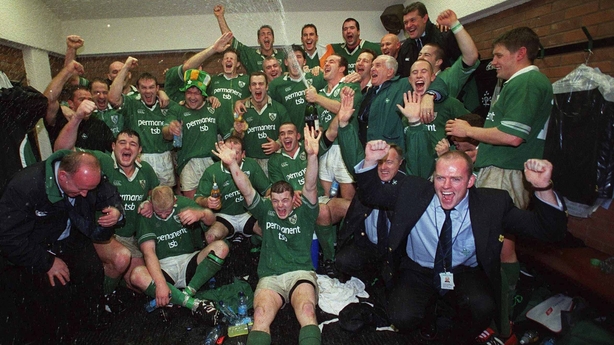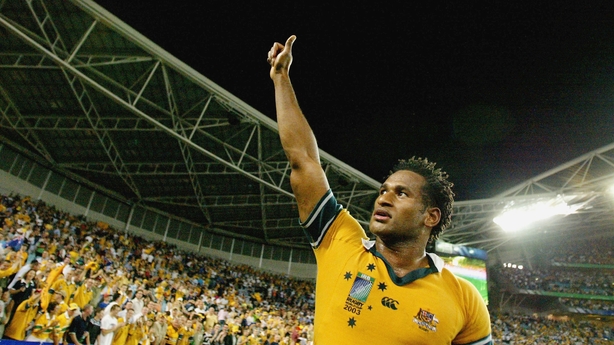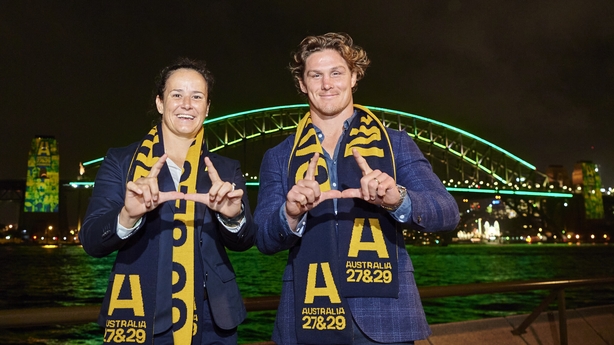While the gulf between Ireland and Australia in rugby's world rankings may not necessarily reflect reality, it's a stark reminder of how quickly the game has changed in either country.
Tonight's contest at the Aviva Stadium sees first play eighth according to the rolling rankings. It's not so long ago that those roles would have been reversed.
Twenty years ago, the Wallabies played their part in a watershed day for the Irish team, beaten 18-9 by Eddie O'Sullivan's side in a tryless slog at Lansdowne Road.
Australia had come to town as world champions, coached by Eddie Jones, and boasting the likes of Matt Burke, Stephen Larkham, George Gregan and George Smith in their side. One year earlier they had beaten the Lions, one year later they would be back in a World Cup final.
Ireland, meanwhile were only fresh off the back of securing their place at the 2003 World Cup Down Under, having had to go through a qualifying tournament against Georgia and Russia due to their dismal showing in 1999.
Back then, going deep into a World Cup was far down on the list of priorities for Ireland, who had gone 23 years without a win against any of the southern hemisphere's 'Big Three'.
It was a coming-of-age day for Ireland; Ronan O'Gara kicking six penalties out of six in a biting wind, and a 23-year-old Brian O'Driscoll standing in as captain of Ireland for the very first time in place of Keith Wood.
"I spoke to Keith [Wood] after the game and he was delighted and at least we have buried that tag of nearly-men," O'Driscoll said at the time.
"We nearly beat New Zealand this summer and South Africa two years ago but this will give us a lot of confidence and self-belief."

It wasn't a declining Australia team either. Twelve months later they reached the World Cup final on home soil, beating Ireland by the skin of their teeth in the pool stage, and only stopped by a Jonny Wilkinson-inspired England in the decider.
Twenty years down the track, they come to Dublin as fierce underdogs rather than overwhelming favourites. As it was in 2002, it's 12 months out from a World Cup.
While it would be harsh to call it a decline - Australia reached a World Cup semi-final in 2011 and the decider in 2015 - their successful hosting of the 2003 tournament should really have been a platform to kick on and become one of the dominant forces in the game. But it never materialised.
"John O'Neill, the CEO at the time, has been coming under huge criticism with what happened afterwards," Australian rugby writer Christy Doran told the RTÉ Rugby podcast this week.
"There was a massive treasure chest of around $40m (Aus). There was a rapid expansion of Super Rugby from three to four to five franchises, a competition which perhaps started to lose the interest of those supporting it.
"Where was the money spent? There was the implementation years later of a third-tier competition, which for many people was a really important thing, but was the money properly spent, well resourced? There were high contracts for dual-international like Lote Tuqiri (below).

"It certainly wasn't the best resources for it. They're paying the price for it now, and they have been for many, many years."
Performances on the pitch have been poor this season, eight defeats in 12 seeing them drop down the rankings and bring huge scrutiny on head coach Dave Rennie, but the off-field state of Australian rugby does appear to be slowly moving on an upward trajectory.
In 2020, an already cash-strapped union very nearly went insolvent when the Covid-19 pandemic hit, but after taking out loans of more than $25m and reducing the number of staff from more than 200 down to around 50, their current chairman Hamish McLennan is hopeful they can be debt-free by 2025.
Just a few hours before the Wallabies kickoff against Ireland, Australia will take on Samoa in the final of the men's Rugby League World Cup at Old Trafford, with union long living in the shadow of its cross-code rival Down Under.
Union has fallen down the order of sports in Australia, Doran telling RTÉ Sport that at certain times in the year it might rank among the sixth or seventh most popular sports, as Formula 1 and boxing experience a renaissance.
The men's World Cup returns there in 2027, with the women's competition set to follow two years later.
And Doran says while it represents one desperate push to win the hearts and minds, there's huge confidence it will be a success.

"It will be well supported, because it's not just going to come out at random, not like the 20/20 Cricket World Cup where Ireland had a successful campaign down in Australia recently.
"That was terribly supported because there's a World up every couple of years.
"For the Rugby World Cup, it's going to have been 24 years [since it was last there], that will be very well supported.
"Who manages to secure the World Cup final? We'll see in the next few months, because that will be a competition between Sydney, Melboure and Perth."
If those at Rugby Australia want inspiration, they only have to look towards France for a blueprint over the next few years.
In 2018 and 2019, Les Bleus were at rock-bottom before Fabien Galthie built them back up from rubble, trusting youth and building a side who are now likely to be favourites to win their home World Cup next year.
Even in the short-term, Australia coach Deve Rennie will know there is an opportunity for them to make a mark at RWC 2023. One of the quirks of the World Cup draw sees the pool stage draw made long in advance of the tournament, with seedings that have changed multiple times over by the time the tournament rolls around.
As such, their main competition to finish top of Pool C will be Wales, a side who are equally struggling to put together consistent results. And with their group paired with Pool D in the quarter-finals, there is scope to reach a semi-final having avoided France, Ireland, New Zealand and South Africa.
There may be shadow-boxing when the Wallabies travel to Cardiff next week.
Listen to the RTÉ Rugby podcast on Apple Podcasts, Soundcloud, Spotify or wherever you get your podcasts.
Follow a live blog on Ireland v Australia on RTÉ.ie/sport and RTÉ News app this Saturday from 8pm with live radio commentary on RTÉ Radio 1.


